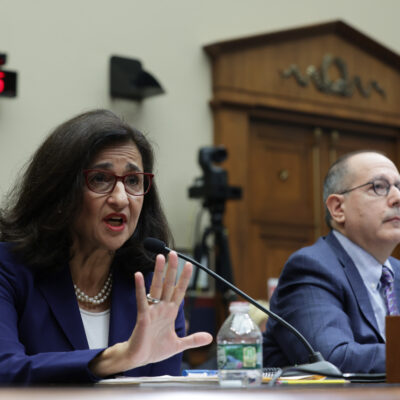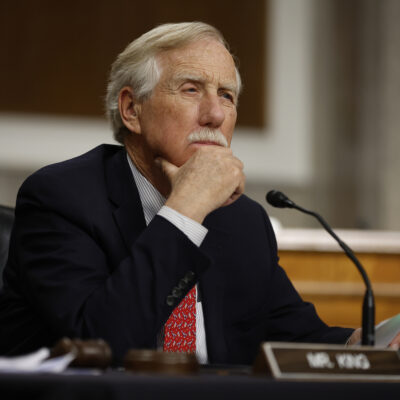Lipstadt: Sunrise DC move to boycott Jewish groups an ‘overtly antisemitic act’
The Holocaust historian, who is awaiting Senate confirmation to be the next State Department antisemitism envoy, spoke at a virtual event organized by the Combined Jewish Philanthropies

Elisabetta A. Villa/WireImage
Deborah Lipstadt walks a red carpet for 'Denial' during the 11th Rome Film Festival at Auditorium Parco Della Musica on October 17, 2016 in Rome, Italy.
Deborah Lipstadt, the Biden administration’s nominee to be the State Department special envoy to monitor and combat antisemitism, discussed her nomination, the recent antisemitism controversy involving the Sunrise Movement’s D.C. chapter and her approach to and concerns about modern antisemitism at an event on Monday night.
The historian and Emory University professor addressed a virtual audience from the Combined Jewish Philanthropies of Greater Boston. Her participation in that event was a somewhat unusual move for a nominee awaiting Senate confirmation, but offered clues as to how she might tackle the position if confirmed.
Lipstadt addressed a recent statement from the D.C. chapter of the climate activist organization Sunrise Movement, in which the group announced it would not collaborate on voting rights issues with several pro-Israel Jewish groups.
“It was an overtly antisemitic act,” Lipstadt said. “If you support the existence of the state of Israel according to this, then you are a racist… What it is saying is that, ‘You Jews, as a people, you do not have a right to a national identity.’”
She noted that the group did not have the same objections to non-Jewish groups that also support Israel, like the American Federation of Teachers.
Lipstadt also drew a distinction between the Boycott, Divestment and Sanctions movement at large and individual supporters of BDS, particularly students on college campuses who she said may have “backed into antisemitism.”
“Young people on campuses who support BDS because they see it as a way of changing Israel’s policies, I don’t label them as antisemitic. I think they’re wrong. I think it’s a mistake,” she said. “But if you look at the founding documents of the BDS movement, you see an effort to destroy the state of Israel. There’s no question about it. That I find antisemitic.”
The historian named both Hungarian Prime Minister Victor Orban — pointing specifically to his attacks on Hungarian-born philanthropist George Soros — and former British Labour Party Leader Jeremy Corbyn as purveyors of antisemitism, from the right and left sides of the political spectrum.
“I don’t surprise easily,” she said. “Even I am surprised with the degree of antisemitism and the freedom people feel to express that antisemitism. Something is changing.”
Modern-era antisemitism is distinct from antisemitism in past eras in several ways, Lipstadt explained: social media allows it to spread much more widely; it is “coming from numerous places at the same time” and “certain social barriers… that kept people from saying certain things have fallen.”
Lipstadt noted that Jewish students on college campuses in particular seem to be feeling less and less comfortable expressing both their support for Israel and their faith.
“We have a lot of work to do. We have to be willing to be uncomfortable. Students don’t want to be uncomfortable. Students don’t want to take a lonely stand,” she said. “We’ve got to support them and show them how to deal with [debates about Israel] in a nuanced way and not in a ‘we’re always right’ kind of way.”
Lipstadt said she started regularly wearing a Jewish star a year and a half ago “because I didn’t want to pass [as non-Jewish]. I wanted to say who I was… I’m afraid there are too many people wanting to pass because it’s difficult [to be Jewish.] It’s a painful fight to be in. But we have fought more painful fights.”
But, she added, she does not want Jews to “feel strong in their Jewish identity because of antisemitism,” pointing to an incident in which a student told her he began wearing a kippah as a response to growing antisemitism.
“On the one hand I love his moxie or what we might call chutzpah,” she said. “On the other hand, my heart broke a little bit. Because I would want him… to want to be drawn to [his] tradition, [his] culture because it has so much to give to the world… It’s not just what we’re against. It’s what we’re for.”
Lipstadt said she’s been asked why, given her tenured position at Emory, she decided to take up the role, and that initially she did not want to be considered.
“I wasn’t going to let my name be put in the hat, but someone said to me, ‘Deborah, you can make a difference,’” she recalled at the event. “And I can think of no better thing to aim at being able to do. I won’t solve the problem, no one person can solve the problem. But if I can make a difference… dayenu, it will be enough.”










